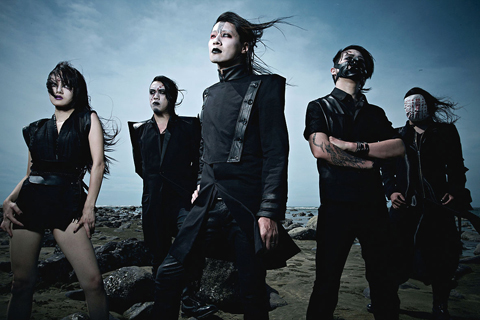|
¡@
Stars from
the underworld
¡@
Chthonic, Taiwan¡¦s most loved
metal band, continues to see its celebrity status grow with the release of
¡¥Mirror of Retribution¡¦
By David Chen
STAFF REPORTER
Monday, Jan 11, 2010, Page 13
¡@

Chthonic is more
hellacious than ever with its newest release.
PHOTO COURTESY OF CHTHONIC
¡@
For a band that dresses in black leather, wears ghoulish
white face paint and sings about the multiple depths of hell, Chthonic (°{ÆF)
wields an impressive amount of star power, both on and off stage.
The five-person ensemble, whose members call their music ¡§extreme metal,¡¨ is the
country¡¦s best-known rock export and an indie success story.
In 2000, Chthonic (pronounced ¡§thonic¡¨) was the first Taiwanese band ever to be
invited to perform at Japan¡¦s Fuji Rock Festival. The band soon gained a cult
following after signing with a US label and playing at metal festivals in Japan,
North America and Europe. In 2007, the group landed an opening slot on British
metal legend Ozzy Osbourne¡¦s Ozzfest tour, taking in 24 major American cities.
Today Chthonic is signed with Spinefarm, part of Universal Records, and has just
completed a 30-date tour of North America and Europe in support of its latest
album, Mirror of Retribution, released in mid-2009 and produced by Anthrax
guitarist Rob Caggiano.
¡@

Chthonic bassist Doris
Yeh has been enjoying the limelight lately as a cover girl.
PHOTO COURTESY OF CHTHONIC
¡@
And the hype is only getting bigger, at least in metal
circles. Last year, Chthonic beat venerated heroes such as Megadeth and Slayer
to take British magazine Terrorizer¡¦s readers¡¦ poll for best band.
So, what next?
¡§Now we are in the fashion business,¡¨ joked front man and singer Freddy Lim
(ªLÎë¦õ) in an interview last week with the Taipei Times.
It certainly looks that way for bassist and band spokeswoman Doris Yeh (¸´ð©É),
who has been enjoying the spotlight as a rock starlet. She was featured as one
of the ¡§hottest chicks in metal¡¨ in the US bi-monthly Revolver and is in the
magazine¡¦s 2010 calendar. Homegrown publications have also caught Doris-fever.
Yeh graced the cover of men¡¦s magazine FHM in 2008 and she features in a
five-page spread in this month¡¦s edition of GQ Taiwan.
While Yeh may be stoking metalhead yearnings, darker fantasies are to be found
on Chthonic¡¦s latest CD, which contains a barrage of machine-gun drumbeats,
distorted guitar riffs, and vocals that range from guttural to screeching.
Mirror is Chthonic¡¦s most refined work to date, released in two versions, one in
Hoklo (commonly known as Taiwanese) and the other in English.
¡§We wanted to write an album that tried to include the whole philosophy of hell,
of Oriental hell,¡¨ said Lim, who drew on Taoist mythology to write the lyrics,
which include images like ¡§a mountain of knives¡¨ and phantoms with their tongues
ripped out.
Modern Taiwanese history plays a major role in Lim¡¦s story. The liner notes to
Mirror of Retribution tell an elaborate backstory that takes place at the time
of the 228 Incident, when Chinese Nationalist Party (KMT) troops massacred
hundreds of civilians.
The album¡¦s hero, Tsing-guan, is a mystic who sets out to help his friends in
the 27th Brigade, a volunteer youth militia that fought against KMT troops who
marched into Taichung in the weeks after the 228 Incident.
To help the militia, Tsing-guan uses his supernatural powers to enter the spirit
world to steal the ¡§Book of Life and Death,¡¨ which holds the key to controlling
life in the mortal world and has the power to reverse the course of history.
The songs depict Tsing-guan¡¦s journey through the multiple levels of hell (there
are 18 main levels and 10 courts of hell, according to Lim), where he engages in
epic battles and gory encounters with ghosts, beasts and other wicked creatures.
But Tsing-guan fails to retrieve the book and save his friends. In the final
song, he is banished to the edge of hell, where he is shackled to the Mirror of
Retribution and forced to serve a ¡§timeless sentence¡¨ of watching his comrades
butchered by ¡§the tyrannical regime¡¨; he watches as his ¡§motherland,¡¨ and
eventually the universe, disappear.
¡§We like tragedies,¡¨ said Lim, who used the 228 Incident as the backdrop because
¡§the history makes the story seem very real.¡¨
Finding inspiration in Taiwanese lore is nothing new for Chthonic, whose past
albums contain stories about crossing the Taiwan Strait and battles between
Aboriginal and Han Chinese spirits.
Lim¡¦s creation of a heavy metal mythology takes its cue from the Scandinavian
black metal bands he admires. ¡§I need something local [so] I can feel the same
kind of anger and sadness like the Scandinavians,¡¨ he said.
Lim is the owner and founder of The Wall (³oÀð), Taipei¡¦s biggest indie rock
venue. But he is perhaps most visible for his vocal support of Taiwanese
independence and criticism of China¡¦s human rights record.
In 2003, he organized the first Tibetan freedom concert in Taipei, which was
headlined by the Beastie Boys. In 2008, he started a civic group, Guts United,
to rally the youth vote for the Demo- cratic Progressive Party¡¦s presidential
campaign.
Such activities might be a turn-off for some music fans, but Lim and Yeh are
unapologetic. ¡§As citizens, we have to care about politics very much, especially
in a situation like Taiwan, where we are trapped in a very complicated
international-political [position]. ¡§
¡§Because you don¡¦t care about politics, you think we care too much,¡¨ said Yeh of
those who criticize Chthonic¡¦s stance. ¡§But as a human, as a citizen, to care
about politics is very natural.¡¨
Does Lim hope fans will adopt his views? ¡§No, I don¡¦t,¡¨ he said. ¡§Music is
music. I try to write songs and compose an album in a musical way.¡¨
Still, Chthonic has been known to walk a fine line between music and politics.
The band¡¦s 2007 US tour received funding from the Government Information Office
and was entitled ¡§Taiwan UNlimited¡¨ in reference to the nation¡¦s exclusion from
the UN; Lim also penned the song Unlimited Taiwan, which includes the rallying
line: ¡§Limited freedom, limited right, unlimited island, unlimited fight.¡¨
Unsurprisingly, Chthonic hasn¡¦t been able to get permission to play in China.
Yeh says she couldn¡¦t care less, as she¡¦d rather see the band tour the US and
Europe and visit new places, such as South America.
Lim, who ¡§loves¡¨ visiting China and had been there seven times before he was
blacklisted after organizing the first Tibetan freedom concert in 2003, says one
of his favorite pastimes is to watch ¡§our Chinese fans fight with each other¡¨ on
Internet forums.
He says there are three types of Chinese fans: those that like the music but
hate the band¡¦s political views; those that like the music
but don¡¦t care about the politics; and those that support an independent Taiwan.
¡§So I would love to play for [all of] them,¡¨ he said. ¡§I would love to play
wherever our fans are.¡¨
|
![]()
![]()
![]()